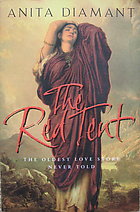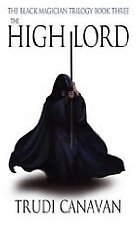Review: ‘The Lieutenant’s Lover’ by Harry Bingham
Author: Harry Bingham
Published: Harper, 2006, pp. 442. Originally published 2006
Blurb: Misha is an aristocratic young officer in the army when the Russian revolution sweeps away all his certainties. Tonya is a nurse from an impoverished family in St Petersburg. They should have been bitter enemies; and yet they fall passionately in love. It cannot last and, as the political situation grows ever worse, Misha is forced to flee the country.
Thirty years later, Misha has survived the war and seeks to rebuild his life in the destroyed city of Berlin. Then, one snowy winter’s day, he glimpses a woman who resembles Tonya. Can this be his lost love? Drawn into a dangerous double game of espionage and betrayal, the two lovers struggle to find each other, as the divide deepens between East and West…
When, where and why: I have no idea when or why I bought this, but I’ve definitely had it for long enough to it to become book 31/50 for my (rather optimistic, given the date) Books Off the Shelf Challenge. I decided to read it as one of the categories in the challenge in which I’m taking part on Goodreads was to read two books by different authors which shared a common word in the title. After the success of The French Lieutenant’s Woman I decided that ‘lieutenant’ was my word and so this book came out of hibernation.
What I thought: Initially I found this book quite disappointing. After reading Anna Karenina earlier this year I was looking forward to a return to Russia in this book, but Harry Bingham doesn’t do the landscape justice and the vocabulary and description never quite got there: it didn’t feellike Russia. The story also starts off with a string of unbelieveable events, which doesn’t help matters: Misha, a former aristocrat, instantly trusts and takes into his confidence Tonya, a member of the working class, whose cousin is an important figure locally in the revolution and has just been round to seize more of his family’s belongings. Sounds completely realistic to me. Naturally, Misha and Tonya fall in love, but this is portrayed without any preamble or sense of development, so I wasn’t invested in their relationship in any way because it came out of the blue.
Fortunately, this section of the story is quite short and the narrative picks up a great deal once it relocates from revolutionary Russia to post-war Berlin. I’ve read a lot of historical fiction books surrounding the Second World War but I think this is the first one which deals with the aftermath of the conflict rather than the fighting itself, so it was very interesting from that perspective. This second part of the novel follows the separate lives of Misha and Tonya as they try to cope in the ruins of a city governed by four different armies (although only three, the British, the Americans and the Russians, are of any relevance to the book), never giving up hope of finding one another again.
I enjoyed the fact that, after such a swift romance in the initial stage of the novel, Harry Bingham doesn’t give Misha and Tonya an easy ride after this. There are continuous near-misses as the two are almost reunited again only to be foiled by circumstance, and this allowed me to develop the interest in seeing their relationship succeed which was absent from the portion set in Russia. I also liked Bingham’s decision to give both Misha and Tonya lives outside of their love for one another: I find novels where the characters fall in love instantly, are separated after a few months and then spend the rest of their lives waiting for one another deeply unrealistic, so I was happy that the book didn’t go down this route. Instead, Misha and Tonya both marry and have families and, although these are naturally conveniently out of the way by the time the two lovers try to find one another again, I appreciated this nod to realism.
Sadly, I thought that this novel went full-circle: it had a bad beginning, a good middle and reverted to a bad ending. I found the way that Bingham provided a brief historical outline of the rise and fall of the Berlin Wall and the end of separation between East and West Germany in the complete absence of any plot to be lazy. It would have been netter if the lapsed time had been implied by a dated chapter heading, as in other places in the novel, or fleshed out so that these events seemed relevant to the characters. Left as it was I thought it was a bit sloppy really. It’s a shame this book was so let down by its introduction and conclusion.
Where this book goes: This one is staying put for now, but it’s a marked man now. I have a collection of books tagged that I wouldn’t mind losing if I need to get rid of some prior to moving house, and The Lieutenant’s Lover is headed there.
Tea talk: In this book, Tonya’s cousin remarks to her: “The greatest empires of the world have always been tea-drinking. The Chinese. The Mughals. The British, of course. Now it’s our turn. The rise of the Russian tea-drinking empire”. What else could I drink in honour of the Russian tea-drinking empire but Russian Caravan?
Review: ‘The French Lieutenant’s Woman’ by John Fowles
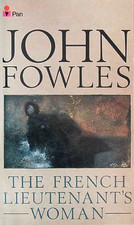
 Title: The French Lieutenant’s Woman
Title: The French Lieutenant’s Woman
Author: John Fowles
Published: Pan Books, 1987, pp. 399. Originally published 1969.
Genre: Historical fiction
Blurb:In this contemporary, Victorian-style novel Charles Smithson, a nineteenth-century gentleman with glimmerings of twentieth-century perceptions, falls in love with enigmatic Sarah Woodruff, who has been jilted by a French lover. (Goodreads.com)
When, where and why: I think my mother picked this book up for me to take on holiday when we went to Charmouth, just along from Lyme Regis, one May half term. However, as my primary focus while on holiday was revision for the upcoming exams this book was neglected in favour of Latin verbs endings (although not by choice). It’s sat on my shelves ever since and I discovered it when I was reorganising some books, an activity I find almost as satisfying as reading them. This OAP definitely qualifies for book 30/50 for my Books Off the Shelf Challenge.
What I thought: The first thing I have written in my reading journal for The French Lieutenant’s Woman is, “I love this book. I’ve only read the first few pages and already I’m completely hooked. I can’t believe I waited to long to read this”. My initial enthusiasm remained undimmed throughout the whole course of the book and it turned out to be one of my favourite reads of this year.
The French Lieutenant’s Woman at times reads exactly like a Victorian novel; Fowles is able to mimic the style impeccably and I often forgot I was reading a modern piece of writing. However, the text is peppered with dry observations on the characters, the Victorians or the process of writing a story that come from such a modern perspective that they jolted me out of this false sense of period and made me aware of what the author was doing. Fowles has a very knowing, self-conscious narratorial voice in these passages which can put some readers off, particularly as they often interrupt the flow of the story. He does like to draw attention to just how clever he is being, but as I whole-heartedly agree with him it’s very difficult to find this an irritating trait. In fact, I thought that Fowles observations and reflections on being Victorian, something obviously impossible in contemporary novels, added an extra layer of richness to the text. He uses the distance and perspective provided by time to make explicit the cultural points of view latent in these Victorian novels and provide commentary on them. I think it’s great that he doesn’t just write a historical novel butinstead uses a historical style and setting to produce something so lucid and clever.
The story centres around Charles Smithson, who is staying in Lyme Regis visiting his fiancee, Ernestina, prior to their wedding. There he meets Sarah Woodruff, also known as Tragedy or, less kindly, as the French Lieutenant’s Woman. As he becomes increasingly fascinated by Sarah he is forced to reexamine his own values as his forthcoming marriage is threatened. Charles is a thoroughly intriguing central character: although not always likeable, he is so open and honest with himself that it is impossible not to sympathise with him as he struggles with doing what is morally right but socially unacceptable. At one point Fowles says:
You will see that Charles set his sights high. Intelligent idlers always have, in order to justify their idleness to their intelligence. He had, in short, all the Byronic ennui with neither of the Byronic outlets: genius and adultery. (p. 19)
I got the impression that Fowles rather likes him even though he may not approve of him. His ‘sinister fondness‘ (p. 17) for spending time in the library, so frowned upon by his uncle, is another trait designed to make him appeal to the reader.
Fowles employs a similar tactic when talking about Sarah and her days at boarding school:
Thus it had come about that she had read far more fiction, and far more poetry, those two sanctuaries of the lonely, than most of her kind. They served as a substitute for experience. Without realising it she judged people as much by the standards of Walter Scott and Jane Austen as by any empirically arrived at; seeing those around her as fictional characters, and making poetic judgements on them. (p. 50)
I know I can identify with this statement, and I’m fairly sure it’s designed to make Sarah appeal to the reader (who, it’s reasonable to assume, has probably read a few books before) and makes her relatable rather than aloof, as she initially appears. I felt I was manipulated into liking her, just as Charles is, while Ernestina on the other hand, the woman with a legitimate claim to affection, is not a sympathetic character at all. She is constantly shown playing games and acting rather than being sincere, a trait which continues even during moments of what should be genuine emotion.
Considering Fowles’ frequent interruptions of the narrative and drawing attention to the fictionality of the characters, I was surprised at how invested I was in Charles and Sarah and what happened to them. Shortly before the end of the novel, Fowles observes:
Fiction usually pretends to conform to the reality: the writer puts the conflicting wants in the ring and then describes the fight — but in fact fixes the fight, letting the want he himself favours win. And we judge writers of fiction both by the skill they show in fixing the fights (in other words, in persuading us that they were not fixed) and by the kind of fighter they fix in favour of: the good one, the tragic one, the evil one, the funny one, and so on. (p. 348)
This explicitly states that there is no ‘real’ ending in fiction, just the author making things work out in his own way, yet still I cared about what ‘really’ happened. This year I’ve discovered that it takes a lot for me to forgive an author messing around with the story: it has to have a point and it has to be well executed. The French Lieutenant’s Woman exhibited both of these qualities and so was a fantastic book from beginning to end.
Where this book goes: I’m definitely keeping this book as it’s one of my favourite books of 2010. However, my copy has been annotated (with the blindingly obvious, which is annoying, rather than with insightful comments which would be quite interesting) so I’ll be on the lookout for a replacement copy as I prowl the charity shops. There’s a particularly attractive Vintage version which I’m hoping to spot.
Tea talk: I’ve been on the Lapsang Souchong again, as it’s been so cold recently. Now that we have heating again (for which I am eternally grateful) I don’t spend my evenings huddled in front of the fire any more, but this tea brings back that lovely smokey smell which I’m missing, surprisingly.
Victorian literature challenge 2011
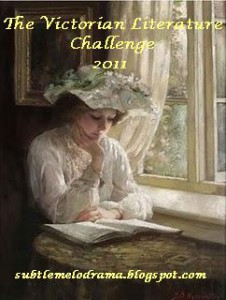 After the fun I had joining in with the R.I.P. Challenge this year I’ve beein looking around for some challenges to join for the coming year. Given the immense proportions of my TBR pile, I like reading challenges which provide me with gentle encouragement to read the books I already own, rather than those that tempt me to buy new books (and, lets be honest, I don’t need much tempting).
After the fun I had joining in with the R.I.P. Challenge this year I’ve beein looking around for some challenges to join for the coming year. Given the immense proportions of my TBR pile, I like reading challenges which provide me with gentle encouragement to read the books I already own, rather than those that tempt me to buy new books (and, lets be honest, I don’t need much tempting).
I have a sizeable stack of unread Victorian novels on one of my shelves, which is rather worryingly suspended from the wall above my bed. As death by collapsing bookshelf à la Leonard Bast in Howards End is not on my list of things to accomplish in 2011 (‘get married’ and ‘buy house’ take precedence over ‘die excruciatingly painful death’) I feel I should probably get around to reading some of them and removing the imminent peril. Consequently, I was thrilled to stumble across the Victorian Literature Challenge 2011, run by Bethany of words, words, words. It seems the ideal way to get me reading some of these rather intimidating tomes and also gives me plenty of people with whom to chat about them. I look forward to seeing what everyone else reads.
What you need to know:This challenge will run from 01 Jan 2011 – 31 Dec 2011.
Participants can sign up at any time throughout the year.Read your Victorian literature.
Queen Victoria reigned from 1837-1901. If your book wasn’t published during those particular years, but is by an author considered ‘Victorian’ then go for it. We’re here for reading, not historical facts! Also, this can include works by authors from other countries, so long as they are from this period.Literature comes in many forms.
There are so many Victorian reads out there, including novels, short stories, and poetry. One poem doesn’t count as a ‘book’: pick up an anthology instead!Choose your books.
List your books before you begin, or pick up titles along the way. It’s up to you! You can review them if you choose to, but it’s not necessary. If you don’t have a blog, that’s fine! Link to a Facebook, or a page somewhere where you can list what you’ve been reading. If you can’t link up, no problem – feel free to just comment and enjoy.Spread the love.Post the reading challenge on your blog – make your own post(s), or stick the button on the side of your page. The more the merrier, after all. Let’s build a big community of Victorian literature lovers!Choose from one of the four levels:Sense and Sensibility: 1-4 books.
Great Expectations: 5-9 books.
Hard Times: 10-14 books.
Desperate Remedies: 15+ books.
- The Warden by Anthony Trollope (1855) – I really want to get to this one as I’ve been reliably informed that I will love it.
- Middlemarch (1871-72) and The Mill on the Floss (1860) by George Eliot – I’ve tried to read The Mill on the Floss twice now, but I’ve been unable to get into it. I thought Silas Marner was excellent though, so I have encouragement. Should I try the book a third time or try Middlemarch instead?
- Mary Barton by Elizabeth Gaskell (1848) – Cranford was such a sweet book that I definitely want to read more from this author, and this is the one that I happen to have on my shelves.
- Villette (1853) and Shirley (1849) by Charlotte Brontë - I hope to read Villette before the end of the year, but if not it will definitely be on the list as Jane Eyre is quite possibly my favourite book ever.
- The Tenant of Wildfell Hall (1848) and Agnes Grey (1847) by Anne Brontë – I’ve shamefully neglected this Brontë sister for far too long. Which one should I try first?
- Something by Wilkie Collins – The Woman in White was one of my favourite books that I read this year. I’ve already read The Moonstone, but so long ago that I can hardly remember it so I might revisit that one. Alternatively, I could go for something new. Any Collins recommendations?
- Something by Thomas Hardy – I started to read numerous novels by Hardy numerous times when I was younger but I found him so unrelentingly bleak and depressing that I never made it through a book and now I’m a bit Hardy-shy. I think this is the year to conquer my fear of Hardy, so which would you say is his most approachable work (no joking and recommending Jude the Obscure)? I have Tess of the D’Urbervilles and The Woodlanders, but I could probably sacrifice a penny or two to purchase a new book if it happened to be a better read. It might be best to start afresh anyway.
- Something by Dickens – I have a lovely cloth bound set of the complete works of Dickens which I picked up in a charity shop for a mere £15 a few years back, but I’ve only read the two of his novels that were assigned reading at university (Oliver Twist and Great Expectations) and I want to read more this year. Any suggestions for where to begin?
Review: ‘Tales from the Country Matchmaker’ by Patricia Warren
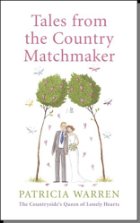 Title: Tales from the Country Matchmaker
Title: Tales from the Country Matchmaker
Author: Patricia Warren
Published: Hodder & Stoughton, 2006, pp. 248. Originally published 2003.
Genre: Memoir
Blurb: Since she founded the Farmers’ and Country Bureau from her farmhouse in the Peak District more than twenty years ago, Patricia has been helping love to blossom the length and breadth of rural England. She has hundreds of marriages to her dredit and numerous babies including one set of quads.
A born matchmaker whose warmth, patience and humour have literally changed the lives of thousands of people, here she brings us the real life stories of love and romance she has helped to create. Tales from the Country Matchmaker is pure delight and a heartening reminder that there really can be a happy ever after.
When, where and why: I picked this book up from a local charity shop to add to my collection of wedding reading.
What I thought: Tales from the Country Matchmaker was a sweet book, full of stories of pleasant people, isolated by character or circumstance, being brought together for a happier future. Patricia Warren, the eponymous matchmaker, was obviously a lovely woman who had a wealth of interesting anecdotes to relate, but unfortunately I didn’t think that the book was very well organised, so it quickly began to feel repetitive and muddled, although undoubtedly earnest, gentle and heartwarming.
One of Patricia’s clients remarked:
The trouble is, we’re all fed a diet of knights in shining armour whereas what I had in reality was this decent, good-looking, nice man who I was terribly comfortable with, but wasn’t fireworks and parties every night and travelling round the world. Maybe the knight in shining armour was around the next corner. But the guy who produces the fireworks is not the guy you want to spend your life with. The comfortable alternative sometimes puts people off because lots of us want to live on the edge. What I’ve learnt now is that companionship, trust and laughter are so important, and it can seem fuddy duddy — but it’s not, it’s real. And we do have our firework moments. (p. 118)
This statement encapsulates the tone of the book for me. It was steady, warm, quiet and sweet, at times touching and at others amusing, but sadly without any fireworks to provide a change of pace and mood. I liked this book and thought that it had potential, but I wish that it had been written by someone else who could perhaps have brought the stories to life a bit more and made them seem more individual and exciting.
Where this book goes: This is definitely a BookMooch book. It was an enjoyable quick read but it’s not one I’ll ever read again.
Tea talk: What else could I possibly drink while reading about such traditional country lives than a good, honest pot of strong English Breakfast Tea?
Review: ‘The Red Tent’ by Anita Diamant
Author: Anita Diamant
Published: Pan Macmillan, 2002, pp. 386. Originally published 1997
Genre: Historical fiction
Blurb: Her name is Dinah. In the Bible, her fate is merely hinted at in a brief and violent detour within the verses of the Book of Genesis that recount the life of Jacob and his infamous dozen sons. The Red Tent is an extraordinary and engrossing tale of ancient womanhood and family honour. Told in Dinah’s voice, it opens with the story of her mothers — the four wives of Jacob — each of whom embodies unique feminine traits, and concludes with Dinah’s own startling and unforgettable story of betrayal, grief and love. Deeply affecting and intimate, The Red Tend combines outstandingly rich storytelling with an original insight into women’s society in a fascinating period of early history, and such is its warmth and candour, it is guaranteed to win the hearts and minds of women across the world.
When, where and why: This is yet another of my university charity shop acquisitions. I picked it up because a friend (the same one who recommended Pillars of the Earth, which didn’t exactly fill me with confidence after the fun I had with that) was writing her PhD on Jewish feminist literature and this was one of her texts. I read it now because I’m trying to read as many of my older books before the end of the year to clear them off the TBR pile, so this counts as book 29/50 for my Books Off the Shelf Challenge.
What I thought: The Red Tent instantly drew me in from its very first paragraph:
We have been lost to each other for so long. My name means nothing to you. My memory is dust. This is not your fault, or mine. The chain connecting mother to daughter was broken and the word passed to the keeping of men, who had no way of knowing. That is why I became a footnote, my story a brief detour between the well-known history of my father, Jacob, and the celebrated chronicle of Joseph, my brother. On those rare occasions when I was remembered, it was as a victim. (p. 1)
The narrative voice, that of Dinah, reminded me a lot of that of Margaret Atwood’s wonderful Penelopiad which I read last year. It was strong but slightly melancholy and conveyed the same idea of reclaiming the story of a marginal woman from a great male narrative, telling the story from a new, feminine perspective and revealing what ‘really’ happened.
Dinah’s observations made me realise how little I know about this part of the Bible (in fact, most of my knowledge comes from that dubious fountain of information, Joseph and the Amazing Technicolour Dreamcoat), so I thought I should probably have a look at the original story. The Bible story deals with the dishonouring of Jacob’s daughter when Sechem sleeps with her (rape in the Bible story and willing in the novel), but is mostly concerned with the actions of her male relatives and how this affects them. Aside from a mention of her birth, her life either side of this incident is never mentioned, so Anita Diamant’s story redresses the balance and fills in these gaps.
The red tent of the title is the separate tent set aside for the women where they go while menstruating to keep apart from the men. Leah explains to Dinah at one point:
In the red tent, the truth is known. In the red tent, where days pass like a gentle stream, as the gift of Innana courses through us, cleansing the body of last month’s death, preparing the body to receive the new month’s life, women give thanks — for repose and restoration, for the knowledge that life comes from between our legs, and that life costs blood. (p. 188)
The Red Tent then is a very appropriate title as the book focused almost exclusively on feminine concerns: becoming a woman, giving birth and finding a husband. I appreciated this insight into their secret world and I liked the idea of telling a masculine story to recentre it around the women, but I soon found that their preoccupations and interests were most definitely not my own. The book was well written, but unfortunately its focus wasn’t one that appealed to me and so I didn’t enjoy it as much as I expected. If marriage, babies and rites of passage are your thing though, this is probably a book that you would enjoy.
My only gripe with the book (after all, my lack of interest in giving birth is my fault, not the author’s) was that Dinah’s voice which comes across so stongly at the beginning of the tale quickly becomes lost in the story. Every so often it would resurface, and I loved it when that happened, but unfortunately these flashes of character were rare and a lot of the time I forgot that there was a first person narrator at all.
Where this book goes: I’m not quite sure what to do with this book yet. I think it will stay on my shelves for now, but it’s definitely earmarked for the next time I need to purge some books. Its days are numbered.
Tea talk: After the disaster of the Brazilian tea I decided to go back to an old favourite with this book and so I’ve been drinking my much-loved Milk Oolong. Sweet and comforting on a chilly day.
The sound of silence
It’s been eerily quiet around here recently, hasn’t it? I don’t usually talk about myself at all here, but I feel compelled to apologise for the longer than usual break between posts. I am still alive, but I have been otherwise engaged on an all too fleeting visit here:
No, not Narnia, but York, my favourite city in the world. A couple of years ago I did my MA in York and I completely fell in love with the place for its friendly feel, gorgeous architecture and vast amount of places from which to purchase tea and scones. The Old English Thorn and I had a wonderful three day weekend seeing old friends and revisiting old haunts, not to mention doing impressive amounts of Christmas shopping. On the Saturday morning, we woke up to find the city covered in snow, which only increased as the weekend went on. Unfortunately it didn’t disrupt our journey home (our train was the last one that day to get back to London, alas) but it was lovely to see the city looking so beautiful.
I have been reading (who wouldn’t with five hours’ worth of train journey?) and have four book reviews in the pipeline, so look out for them shortly.
Review: ‘One Hundred Years of Solitude’ by Gabriel Garcia Marquez
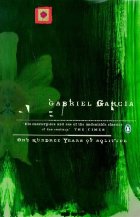
 Title: One Hundred Years of Solitude
Title: One Hundred Years of Solitude
Author: Gabriel Garcia Marquez, trans. Gregory Rabassa
Published: Penguin, 1998, pp. 422. Originally published 1967
Genre: Latin American fiction
Blurb: One Hundred Years of Solitude tells the magical story of the Buendia family, who love, lie, fight and rule for a century in Macondo, their settlement in the South American jungle. Part exotic paradise, part nightmare, Macondo is a fantastic world of miracles and mirages where nothing is as it seems. Its secrets lie hidden for years in an encoded book, and only Aureliano Buendia, the last in the dynasty, can unlock its mysteries and discover the fate of this strange land…
When, where and why: This is yet another book from my charity shop university days when it would seem my eyes were considerably bigger than my reading stomach (plus ca change and all that). I’ve had it kicking around on the shelves for ages now, so it definitely qualifies for book 28/50 for my Books Off the Shelf Challenge, and finally decided to read it to continue to explore areas of literature which are new to me.
What I thought: When a book is as well known and as widely read as One Hundred Years of Solitude it’s hard to approach it without certain expectations. In this case, I was anticipating a magical and mysterious story written in beautiful, evocative prose and while I eventually came to enjoy the book it never quite lived up to these expectations. It’s entirely possible that this was my fault for wanting something out of the book that it just wasn’t, but I found it slow, confusing and, although it had its moments, described in fairly sparse, mundane terms.
The book started out promisingly: I enjoyed the fairytale style of the narrative, as the father trades increasingly large amounts of money and produce with the visiting gypsies for increasingly bizarre and useless items. Had the book continued in this vein I would probably have enjoyed it far more than I did, but as I read on I realised that I was getting further and further into the book without any idea of where it was going, or if it was going to go anywhere at all. I found myself getting frustrated with the book as things happened but nothing ever seemed to change: characters would marry and die, wars would take place, time moved on but everything remained the same. Part of me thinks that this sense of constancy as things change around the Buendia family and they remain unaffected was what Marquez was aiming for (the novel is, after all, called One Hundred Years of Solitude) and that I didn’t get it, but nonetheless I found this made the first two thirds of the novel feel stagnant and it wasn’t something I enjoyed.
Part of the problem is that nearly every male character in the novel is called either Jose Arcadio or Aureliano (or possibly, just for a bit of exciting variety, some variation thereon), making it very difficult to tell them all apart. At one point, the author refers to ‘several of the Aurelianos’ (p. 222), and if even he can’t keep them all straight there’s no hope for the reader. This issue was compounded by the fact that none of them had any distinctive characteristics and so, because they all blurred together, it was hard to get to know any of them. Again, this may have been a deliberate choice on the part of the writer to make the Buendia family feel separated from everyone else including the reader, in which case it was very effective, but that doesn’t mean that I enjoyed the effect. This was combined with the vast majority of events being reported to the reader rather than experienced directly, resulting in everything feeling a bit vague. Being told about apparently insignificant events which happen to characters you neither know nor care for does not an engaging read make.
I don’t know whether it was because the writing improved, or I finally got into the peculiar rhythm of the book, or I just gave up and stopped caring that it was so odd, but I found the final third of the book to be much better than all that had come before and I think this was because the episodes of this section felt more complete and also centred around the female characters, who are much more distinct that the men. I really enjoyed reading about Remedios the Beauty and her sudden flight, Ursula and her clever ways of coping with growing old and losing her sight, Amaranta’s deal with death as she sews her own shroud, and Meme and her love affair accompanied by yellow butterflies. Of course, it was still decidedly odd but, like the initial few pages, it was an oddness with a fairytale logic to it that somehow made sense. However, this section of the book also yielded the biggest eyebrow-raise and snort of laughter in the whole novel, courtesy of this sentence:
…she would play with Aureliano’s portentous creature as if it were a doll and would paint clown’s eyes on it with her lipstick and give it a Turk’s moustace with her eyebrow pencil, and would put on organzi bowties and little tinfoil hats. (p. 411)
Need I say more? I’m sorry, I just had to share that piece of awfulness.
In spite of the writing generally not living up to my expectations, there were moments when it was beautiful and insightful. I thought the tongue-in-cheek explanation of the difference between Conservatives and Liberals was very well done, but possibly my favourite passage describes Pilar Ternera:
Pilar Ternera had lost the trail of all hope. Her laugh had taken on the tones of an organ, her breasts had succumbed to the tedium of endless caressing, her stomach and her thighs had been the victims of her irrevocable fate as a shared woman, but her heart grew old without bitterness. (p. 156)
On the whole though, this book didn’t work for me. I enjoyed parts of the end section, but found the greater part of One Hundred Years of Solitude unappealingly vague. It is considered by many to be a great work of literature though, so I’m perfectly willing to accept that the fault is probably with me rather than the book.
Where this book goes: This book is staying put for now. I have Love in the Time of Cholera by Marquez on my bookshelf and I think I’ll give that one a try in the new year to give him a second chance. If that one is equally disappointing though, both will be off to BookMooch.
Tea talk: As I was reading a Latin American book I thought that now would be the time to try some Latin American tea, so out came the Bolivian Chaimate Esmeraldo from Char in Winchester. I’ve loved all of their teas that I’ve tried so far, so I suppose it was only a matter of time before one came along that broke that trend and this was it. I thought it tasted oddly like the fried crispy seaweed you get in Chinese restaurants, and while I enjoy that taste with fried rice and shredded duck I am less fond of it in a cup of tea.
Review: ‘Fireworks’ by Angela Carter
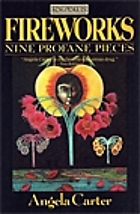
 Title: Fireworks: Nine Profane Pieces
Title: Fireworks: Nine Profane Pieces
Author: Angela Carter
Published: Penguin, 1987, pp. 133. Originally published 1974
Genre: Short stories
Blurb: In each of these mesmerising tales is a search for heightened sensitivity. Reality is left behind. Filtering ordinary experience through her hallucinatory imagination, Angela Carter exposes the subterranean desires and obsessive fears lurking in the unconscious. Her characters are haunting, often sinister: an expatriate Englishwoman who takes a Japanese lover, a white hunter who finds pleasure in killing, a puppet who murders her master. With a voluptuous and elegant style uniquely her own, Angela Carter evokes atmospheres at once erotic and disturbing.
When, where and why: After I was introduced to Angela Carter’s writing at university, I bought everything of hers that I came across. I started reading this one while I was struggling through Pillars of the Earth as it’s a nice, small book and easy to read on the tube, unlike Ken Follet’s huge volume. It counts as book 27/50 for my Books Off the Shelf Challenge.
What I thought: Fireworks is a very apt name for this collection of stories: like fireworks, they are short, sharp bursts of concentrated but brief beauty, all with an underlying element of danger. However, while Angela Carter always writes excellently, this was definitely not my favourite of her short story collections as, although her prose is rich and full it sometimes feels a little stifling in this book and I often caught myself committing the sacrilege of wishing for fewer words and more plot.
In the story ‘A Souvenier of Japan’ Angela Carter’s fictional self says:
But I do not want to paint our circumstantial portraits so that we emerge with enough well-rounded, spuriously detailed actuality that you are forced to believe in us. I do not want to practise such sleight of hand. You must be content only with glimpses of our outlines, as if you had caught sight of our reflections in the looking-glass of somebody else’s house as you passed by the window. (p. 10)
This is a fair illustration of how these stories work: they don’t provide full narratives with fleshed out characters, but give tantalising glimpses into worlds where you can never be quite certain of anything. There is a dream-like quality to the stories which makes them feel uncanny and remote and just a little bit too odd for me, I think. Carter’s epilogue explains exactly what she was doing in this collection and I found that very helpful, illuminating some of the more bizarre elements of these madcap stories (particularly the incest; I swear incest has been a theme in almost everything I’ve read by Carter now). I always enjoy it when an author decides to let their readers in on their thought processes, particularly when they are as patently oddball as Carter’s, so this provided a welcome opportunity to help untangle some of my thoughts on the book.
Even though I found Fireworks just a smidgen too off the wall for my tastes, it still bears Angela Carter’s wonderful writing style. One of my favourite examples in this book is her description of London in the story ‘Elegy for a Freelance’:
London lay below me with her legs wide open; she was a whore sufficiently accommodating to find room for us in her embraces, even though she cost so much to love. (p. 115)
This perfectly illustrates why I love Angela Carter’s writing and will definitely continue to seek out and read her books.
Where this book goes: This book has been slipped back onto the shelf with the rest of my Angela Carter collection. I’m looking forward to the next time I pick up one of her books, although I like to leave a fair while in between them so that she always seems fresh and new.
Tea talk: As I picked up this book specifically to read on the tube there was definitely no tea drunk while reading. I’m lucky to have space to get my book out, never mind a travel mug as well.
Review: ‘Things Fall Apart’ by Chinua Achebe
Author: Chinua Achebe
Published: Heinemann, 1986, pp. 152. Originally published 1958
Genre: African fiction
Blurb: The story is the tragedy of Okonkwo, an important man in the Igbo tribe in the days when white men were first appearing on the scene… Mr Achebe’s very simple but excellent novel tells of the series of events by which Okonkwo through his pride and his fears becomes exiled from his tribe and returns, only to be forced into the ignominy of suicide to escape the results of his rash courage against the white man… He handles the macabre with telling restraint and the pathetic without any false sense of embarrassment.
When, where and why: I bought this book because it was on a list of potential extra reading for a lecture on post-colonialism in my first year of university, part of a course introducing us to different literary ideas. Evidently I decided post-colonial literature wasn’t for me, as I focused on different areas of that course for essays and exams and this book has gone unread ever since. I decided to read it now as it’s very different from what I usually read (books by people who tend to be white, probably British and most likely dead) and I think it’s good to read outside my usual box from time to time. It qualifies as book 26/50 for my Books Off the Shelf Challenge.
What I thought: I’ve already said that post-colonial literature isn’t really my thing, and this book sadly did nothing to change that. I’m not denying that Chinua Achebe does accomplish what he sets out to do in Things Fall Apart by presenting an alternative view of the white colonisation of Africa, and I’m sure it’s very clever, but for me it wasn’t an enjoyable read. Although there were some aspects that I really liked, the vast majority was not to my taste at all.
What I enjoyed about the text was its presentation of Igbo culture and customs. I think that the use of Igbo words is particularly effective in creating a sense of place, although I was very glad that I accidentally discovered the glossary at the back of the book as until that point I had felt rather lost. There are some surprisingly humorous moments which serve to illustrate the differences between the expected norm of Igbo society and what an audience of western readers might assume, such as when a huge swarm of locusts arrives in the village. To me, this suggested a plague of Biblical proportions and disaster for the village, but in fact the villagers are excited and pleased because locusts are a rare and tasty delicacy and so the swarm represents an opportunity for a welcome change in diet, and I really enjoyed this reversal of my expectations. In a similar vein is the supremely logical explanation of polytheism by one of the villagers:
We make sacrifices to the little gods, but when they fail and there is no one else to turn to we go to Chukwu. It is right to do so. We approach a great man through his servants. But when his servants fail to help us, then we go to the last source of hope. We appear to pay greater attention to the little gods but that is not so. We worry them more because we are afraid to worry their master. (p. 129)
Unfortunately, while the setting and background of Things Fall Apart is an interesting departure from what I usually read, I found the story to be a disappointment. The narrative is episodic, but these episodes often seem unfinished. In one chapter, a child is sick and it is feared that she might die, but in the following chapter it appears that some time has passed and the child is well again although there has been no mention of a cure or recovery. In another chapter, the poor weather means that Okonkwo’s entire crop fails leaving him near destitute, yet in the next one he is a rich, respected man with a successful farm and no indication of how he passed from one state to the other. The resolution of important plot points that I expected rarely came, and I found this lack of completion increasingly irritating. Perhaps the unfinished episodes are supposed to reflect that things are falling apart, but whatever the reason it isn’t for me.
Narrative aside, the primary obstacle to my enjoyment was the protagonist. Okonkwo is utterly unlikeable, but isn’t the sort of interesting villain that I enjoy disliking: he is brutish, violent and pigheaded. Although there are suggestions that Okonkwo does have feelings but society and cultural conventions force him not to show them because that would be weak, he seems unique in his brutality rather than fllowing an accepted trend. Okonkwo beats his wives and even tries to shoot one of them, yet another man who does the same is condemned and punished by the tribe, so this casual violence cannot be an accepted norm. I disliked him so much that I couldn’t bring myself to care when things fell apart for him, particularly as this was at least partially through his own actions.
Overall, I enjoyed this book as a presentation of a particular culture but not as a story, and I think it would have been more effective for me if both had been equally as good.
Where this book goes: Although this wasn’t my favourite book (to say the least) I’m going to keep it along with my other university books. I consider them to be a physical record of what I have studied, good and bad, and even though I didn’t actually read this one until much later it still belongs with the rest of them.
Tea talk: I’ve been continuing with my little sample packet of Char’s Assam recently. It has a much more robust taste than I tend to favour, but with practice I’m managing to brew it just right so it’s delicious to drink. I’m tempted to order myself a larger tin of this soon, as I’ve only got enough left for one or two cups.
Review: ‘The High Lord’ by Trudi Canavan
Author: Trudi Canavan
Published: Orbit, 2007, pp. 674. Originally published 2003.
Genre: Fantasy
Blurb: In the city of Imardin, where those who wield magic wield power, a young street-girl, adopted by the Magicians’ Guild, finds herself at the centre of a terrible plot that may destroy the entire world…
Sonea has learned much at the Magicians’ Guild and the other novices now treat her with a grudging respect. But she cannot forget what she witnessed in the high lord’s underground room — or his warning that the realm’s ancient enemy is growing in power once more. As Sonea learns more, she begins to doubt her guildmaster’s word. Could the truth really be as terrifying as Akkarin claims, or is he trying to trick her into assisting in some unspeakably dark scheme?
When, where and why: I got this book along with the first two from someone on BookMooch. I made the mistake of loaning them to the Old English Thorn, who devoured them and has been pestering me to give him the third one ever since. Naturally I couldn’t let him have the book before I had read it, and so I thought I should get round to it sooner rather than later.
What I thought: I thought that The High Lord was a tremendously satisfying end to The Black Magician Trilogy: it ties up all of the loose ends from the previous two books while still leaving room for further development if the author decides to revisit the series. I know that Trudi Canavan has several other books out related to this world, although I’m not sure how exactly the books tie in with the story of The Black Magician Trilogy, so it may be that she’s already done so. After the enjoyment I’ve had from this trilogy, I’ll definitely be investigating the others at some point.
What I liked most about this book was that it actually managed to surprise me, unlike its predecessors. Trudi Canavan’s system of black magic is intriguing and different, not least because of the culture that she has created around it. I thought that the tension that builds up as Sonea and Akkarin try to counter the Ichani on their own is well sustained, helped by the continued futile or dangerous attempts of others to defeat them. The plot twists are excellent, making this definitely the best book in the trilogy and a fitting culmination.
My only issue with the book is that Trudi Canavan’s habit of picking up and dropping characters as it suits her rears its ugly head again. I was pleased to see that Cery makes a return after being mostly (and inexplicably) absent from the middle installment, but other characters suffer the same fate. The first half of the book is set in the Guild and yet Regin, the focus and driving force behind The Novice, is mentioned once in passing and never appears again. I can understand him not being physically present, but Sonea doesn’t even think about him, despite the important role he plays in her development. I like what Canavan did with Regin in the end, but his sudden disappearance prior to that irked me. The same is true of Dorrien, who was also fairly significant in The Novice but isn’t even thought of until the mid point of the book. The part he plays in this final book is also unrelated to his importance in the previous book, which seemed a little disjointed to me. On the whole though, while I would have preferred more consistency, I really liked this trilogy and will definitely be investigating Trudi Canavan’s other books.
Where this book goes: At the moment this book is in the care of the Old English Thorn, but once he has finished reading it, it will be back with its friends on my fantasy shelf.
Tea talk: It’s been cold again recently, so I’ve been drinking Lapsang Souchong. To me, it tastes like curling up in front of a fire on a miserable day and I’ve been doing a lot o that recently.

